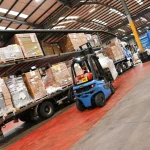
How to Future-Proof Your Supply Chain with Durable Wooden Pallets Made in Kenya
Introduction
Let’s be real—if your supply chain is inefficient, your business is at risk. Delayed shipments, damaged goods, and rising costs can eat into your profits faster than you think. And while many businesses focus on optimizing logistics software or hiring the best operations team, they often overlook a critical factor: the quality of their pallets.
Wooden pallets might not be the first thing you think of when future-proofing your supply chain, but trust me, they should be. The right pallets can cut costs, improve efficiency, and even support sustainability goals. In this article, I’ll break down exactly why durable wooden pallets made in Kenya are the game-changer your business needs.
The Supply Chain Challenges Businesses Face Today
1. Rising Costs and Logistics Disruptions
The global supply chain is more unpredictable than ever. Shipping delays, increased fuel prices, and material shortages mean businesses must be more resilient and strategic in their logistics. Choosing durable pallets ensures fewer replacements, better handling, and less risk of damaged shipments.
2. Environmental Concerns and Regulations
Sustainability isn’t just a buzzword—it’s a requirement. Businesses are under pressure to reduce their carbon footprint and comply with global environmental standards. Wooden pallets are biodegradable, recyclable, and can be repurposed, making them an eco-friendly choice.
3. The Need for Durability and Sustainability
Breakage, replacement, and disposal costs add up. Investing in high-quality pallets that last longer means fewer disruptions and more savings over time.
Why Wooden Pallets Are the Best Choice
Wooden pallets have stood the test of time for a reason—they offer unmatched strength, affordability, and adaptability. Unlike plastic or metal pallets, they’re easier to repair, cost-effective, and fully recyclable.
- Strength & Load Capacity: Can handle heavy shipments without compromising structural integrity.
- Cost-Effective: Lower initial costs compared to plastic or metal pallets.
- Easy to Repair: Unlike plastic pallets, wooden pallets can be fixed and reused, extending their lifespan.
The ‘Made in Kenya’ Advantage
When you choose Kenyan-made pallets, you’re not just buying a product—you’re supporting local craftsmanship, economic growth, and sustainability efforts.
- Quality materials sourced responsibly – Kenya has access to high-quality, sustainably managed timber.
- Job creation and skill development – Investing in local industries strengthens the workforce.
- Reduced environmental impact – Locally produced pallets cut down on carbon emissions from imports.
Durability: The Key to Long-Term Cost Savings
A weak pallet can cost you thousands in damaged goods and lost shipments. Investing in high-quality, durable wooden pallets means:
- Fewer replacements = lower costs over time
- Less product damage = happier customers
- Stronger supply chains = better efficiency
Sustainability in Pallet Manufacturing
Eco-friendly manufacturing isn’t just good for the planet—it’s smart business. Sustainable wooden pallets meet international compliance standards while supporting a circular economy that reduces waste.
- Eco-conscious sourcing – Using sustainably harvested timber prevents deforestation.
- Recyclability – Wooden pallets can be reused, refurbished, or turned into biofuel.
- ISPM 15 Compliance – Ensures safe export without pest contamination.
How to Choose the Right Wooden Pallets for Your Business
When selecting pallets, consider:
- Load capacity – Can they handle your products?
- Size compatibility – Will they fit your logistics setup?
- Compliance needs – Are they ISPM 15 certified for export?
- Customization options – Do you need branding, specific sizes, or reinforcements?
How to Maintain and Extend the Life of Your Pallets
Want your pallets to last longer? Follow these best practices:
- Proper stacking and storage – Keep them dry and off the ground to prevent warping and mold.
- Regular inspections – Identify weak spots and address damage early.
- Repair instead of replacing – Wooden pallets can often be reinforced and reused.
- Recycling and repurposing – When pallets reach the end of their life, consider upcycling them for furniture or other uses.
Case Studies: Kenyan Businesses Thriving with Local Pallets
Many Kenyan businesses have switched to durable wooden pallets and seen improved efficiency, lower costs, and better sustainability metrics.
- Agriculture: Farmers using strong wooden pallets for produce have reduced spoilage during transport.
- Manufacturing: Local factories have cut logistics costs by switching to longer-lasting pallets.
- Retail & Distribution: Supermarkets have improved warehouse efficiency with customized pallet solutions.
Conclusion: The Future-Proof Supply Chain
If you’re serious about cutting costs, improving efficiency, and building a resilient supply chain, investing in durable wooden pallets made in Kenya is a no-brainer. They’re affordable, sustainable, and built to last—just what your business needs to thrive in a competitive market.
FAQs
- Why are wooden pallets better than plastic?
- They’re more affordable, repairable, and environmentally friendly.
- Are Kenyan-made pallets compliant with global standards?
- Yes! Many are ISPM 15 certified for international shipping.
- How can wooden pallets help reduce supply chain costs?
- They last longer, reduce product damage, and minimize replacement expenses.
- Where can I buy high-quality pallets in Kenya?
- From reputable local manufacturers who prioritize durability and sustainability.
- How do I maintain my wooden pallets for long-term use?
- Proper storage, regular inspections, and timely repairs will keep them in top shape.





Add a comment